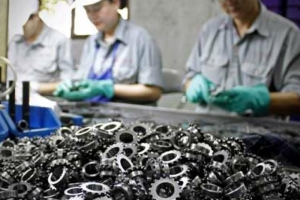Apple relocates 11 manufacturing units to Vietnam
 |
The American tech giant's vote of confidence in the Vietnamese manufacturing sector was discussed by Nguyen Thang Vuong from the Europe-America Market Department of the Ministry of Industry and Trade (MoIT) during an online forum on Vietnam's role in the global supply chain on September 6.
“Meanwhile, Intel has initiated the expansion of its Phase 2 chip verification plant in Ho Chi Minh City, involving an investment amounting to a staggering $4 billion,” said Vuong.
According to Vuong, a shift in the global supply chain has become increasingly evident. For instance, besides the recent strategic moves and multi-billion dollar commitments from Apple and Intel, Danish conglomerate Lego is investing in a factory in the southern province of Binh Duong with an outlay of $1 billion.
“Several prominent American corporations, such as Boeing, Google, and Walmart, have announced plans to extend their supplier networks and manufacturing bases in Vietnam following extensive research into the local investment environment,” he added.
Particularly noteworthy is the colossal shift by Samsung in relocating its entire mobile phone production line predominantly to Vietnam and India. Remarkably, 60 per cent of Samsung's global smartphone output is now manufactured in Vietnam.
This migration of manufacturing groups to Vietnam offers indigenous businesses enhanced access to Western markets and an influx of foreign direct investment (FDI), especially from Northeast Asia. However, these developments also bring formidable challenges for Vietnamese enterprises seeking to integrate into the expansive supply chains of these global juggernauts.
In an interview with local newspaper Tien Phong, Do Thi Thuy Huong, vice-chairwoman of the Vietnam Supporting Industries Association (VASI), highlighted that alongside Apple’s relocation, major conglomerates such as Foxconn, Luxshare, Pegatron, and Wistron are also expanding their existing manufacturing bases in Vietnam.
“The rapid influx of foreign capital, particularly in the electronics sector, is evident. Samsung’s investment in the largest research and development centre in Southeast Asia, valued at $220 million in Hanoi, serves as a testament. Another key player, Hansol Electronics from South Korea, recently secured investment permission for two projects in the southern province of Dong Nai, amounting to $100 million.”
To stay ahead and cater to these industry giants, VASI asserts that local governments need to formulate stronger policies to ensure domestic businesses possess the capability to assimilate technologies and compete sustainably in the market.
A prime focus should be on discerning, high-quality technologies that align with the existing technical prowess of domestic manufacturing and assembly groups. Crucially, any technology introduced should be environmentally conscious and promote the inclusion of Vietnamese suppliers within a stipulated timeframe.
Ngo Khai Hoan, deputy director of the Industrial Department under the MoIT, expressed that while Vietnam had previously capitalised on its inexpensive labour force, rising labour costs are now diminishing this advantage, especially when compared to nations like India, the Philippines, and Cambodia.
“Understanding the potential of domestic supporting industries is vital for attracting FDI. In light of this, the Industrial Department plans to foster initiatives that include policy development, capacity-building for local enterprises, and facilitating connections between domestic businesses and multinational corporations like Samsung and Toyota,” said Hoan.
 | Vietnamese auxiliary manufacturers must engage in global supply chain Vietnamese auxiliary manufacturing businesses need to join in and become a component of the global supply chain. |
 | Vietnam remains a popular destination for supply chain diversification Vietnam was highlighted as a growing significant destination for supply chain diversification among China and other countries at the event themed 'Beyond Boundaries - China and Vietnam Supply Chain Opportunities' held on June 14 in Shanghai. |
What the stars mean:
★ Poor ★ ★ Promising ★★★ Good ★★★★ Very good ★★★★★ Exceptional
 Tag:
Tag:
Related Contents
Latest News
More News
- Vietnam, New Zealand seek level-up in ties (February 19, 2026 | 18:06)
- Untapped potential in relations with Indonesia (February 19, 2026 | 17:56)
- German strengths match Vietnamese aspirations (February 19, 2026 | 17:40)
- Kim Long Motor and AOJ Suzhou enter strategic partnership (February 16, 2026 | 13:27)
- Haiphong welcomes long-term Euro investment (February 16, 2026 | 11:31)
- VIFC in Ho Chi Minh City officially launches (February 12, 2026 | 09:00)
- Norfund invests $4 million in Vietnam plastics recycling (February 11, 2026 | 11:51)
- Marico buys 75 per cent of Vietnam skincare startup Skinetiq (February 10, 2026 | 14:44)
- SCIC general director meets with Oman Investment Authority (February 10, 2026 | 14:14)
- G42 and Vietnamese consortium to build national AI infrastructure (February 09, 2026 | 17:32)






















 Mobile Version
Mobile Version